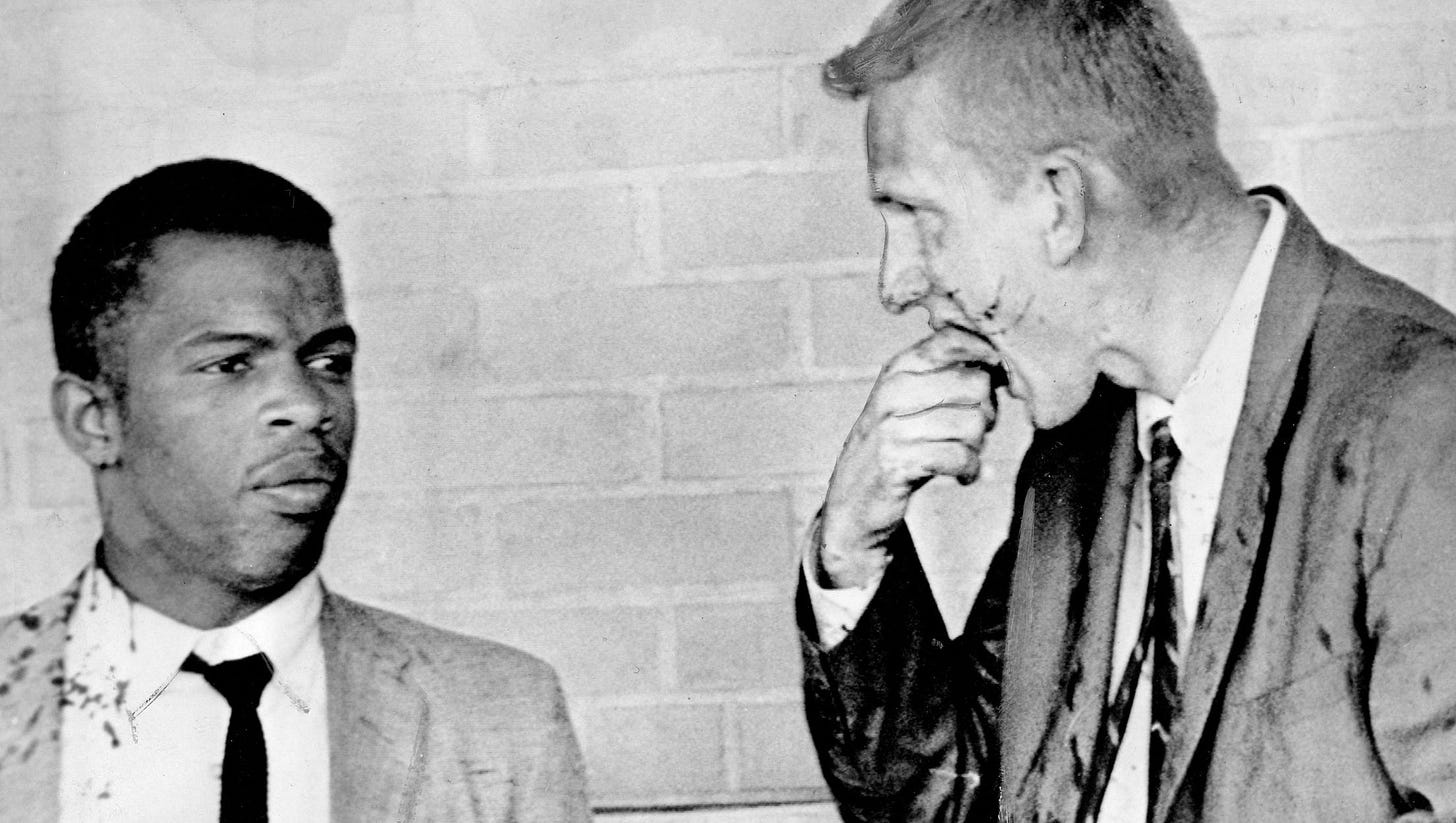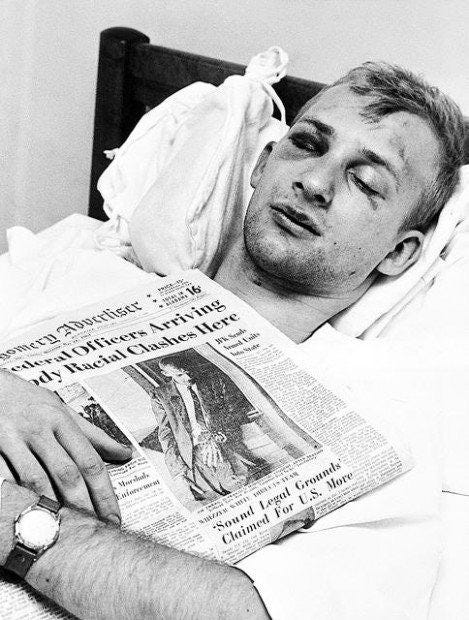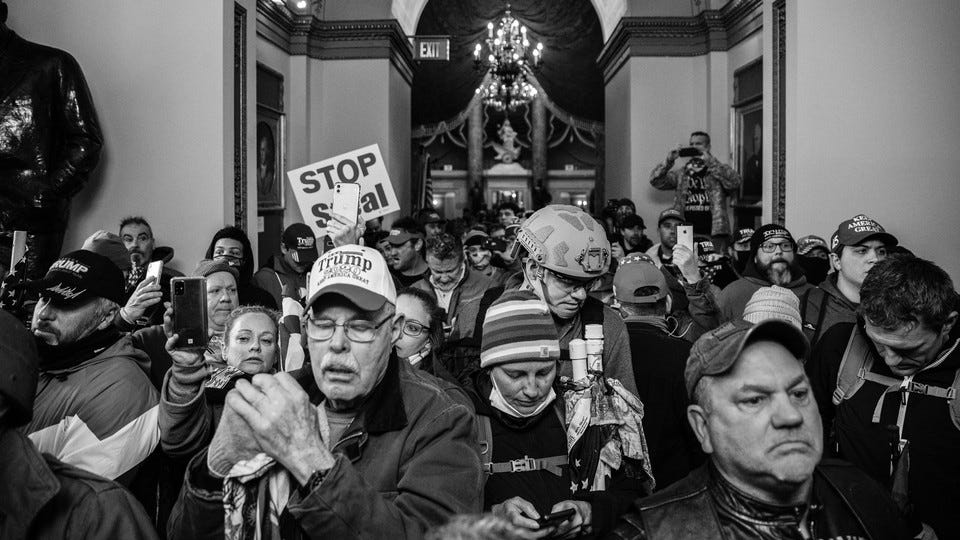Good morning bread friends,
Last night, as I was shaping dough for today’s bread I watched the 2011 documentary, Freedom Riders. It was a brilliant movie that was told largely in the first person by people who participated in the non-violent Freedom Rides and were threatened, jailed, beaten, and who were prepared for death as they pursued dignity and justice under the law.
Rather than trying to summarize the film for you… today I’m going to briefly highlight the life of one Wisconsin man who joined the freedom ride and risked his life in allyship for racial justice in America. I strongly encourage you to prioritize watching this documentary though. If you decide to check it out (or if you’ve already seen it) I’d love to hear any reflections that you have on the film. You could reply to this email, or better yet you could share your reflections with the Bread & Justice community by leaving a comment on this week’s newsletter.
Firstly though, if you’re interested in pre-ordering a loaf of handmade sourdough, now is a great time to click this link and place an order for bread. As I shared at the beginning of this month, 100% of our profits through February will be donated to The Foundation for Black Women's Wellness. As always, thanks to those of you who are local and choose to buy bread from Bread & Justice.

James Zwerg was born and raised in Appleton Wisconsin. He became engaged in the Civil Rights Movement at the age of 21.
He describes himself as having grown up in a progressive and also religious household. Apparently, his father was a dentist who provided free dental care to the poor on one day per month. His parents were Christians who taught him that all humans are created equal. Yet he grew up with a segregated life where he had little to no interaction with black people.
He attended Beloit College (still here in Wisconsin) and there he had a black roommate from Georgia. From racist acts that he witnessed his friend and roommate endure at Beloit, he took an interest in so-called “race relations” and civil rights. When he learned of an opportunity to participate in a student exchange program with Frisk University (an HBCU in Nashville, TN) he seized the opportunity. He has described it as at first mostly an intellectual pursuit. Because he so admired the grace and patience that his roommate carried himself with… James wanted to see how he would handle the experience of being a minority in a campus environment.
At Fisk, James met John Lewis who was the same age as him and was already deeply involved in the Civil Rights movement. This led James to eventually join the Student Nonviolent Coordinating Committee. As such, he began training in the ways of nonviolence. Eventually, he began participating in nonviolent direct action events.
The most famous of these events was the Freedom Rides in 1961. That movement was a group of nonviolent civil rights activists who were determined to ride buses through the segregated south to challenge the unjust laws that states continued to uphold despite the two separate Supreme Court rulings that stated segregated interstate transportation facilities, as well as segregated seating on public buses, were both unconstitutional.
James was one of the Freedom Riders. In Montgomery Alabama, on May 20th, 1961 James was beaten nearly to death in his nonviolent quest for justice. He was the only white person on this particular bus, and his attackers treated him as a traitor to the race and were especially ruthless in their attacks on him.
From an interview in 1995, James describes this moment as such:
You could hear crowd yelling and of course a lot of them were, "Get the nigger-lover!" I was the only white guy there.
I bowed my head and asked God to give me the strength and love that I would need, that I put my life in his hands, and to forgive them. And I had the most wonderful religious experience. I felt a presence as close to me as breath itself, if you will, that gave me peace knowing that whatever came, it was okay. Before I opened my eyes, I was grabbed. I was pulled over a railing and thrown to the ground. I remember trying to get up on all fours because you try to get back to your group.
James survived the bloody incident, and later that same year, Martin Luther King presented him with the Southern Christian Leadership Conference Freedom Award. After a conversation with Rev. King, James decided to enroll in seminary and became a pastor.
I personally didn’t grow up in Wisconsin, so I don’t know if James’ story is common knowledge from History classes or Social Studies classes in the public schools here… but I enjoyed digging in and learning his story.
Countless people made unthinkable sacrifices in order to fight for Civil Rights in this country. James’ story originally sparked my interest because of the Wisconsin connection. But I was especially inspired because I really appreciated his articulation of how even as a white man in an all-white community, his commitment to justice was founded in his understanding of his Christian faith.
You’ll get to learn more details about James’ experience and the amazing triumph of the freedom riders if you decide to watch the documentary.
Another story that really stopped me in my tracks was when a Freedom Rider shared in the documentary her vivid recollection of when her bus was being violently mobbed. Not only were there a mob of white men with pipes and baseball bats and Molotov cocktails surrounding the bus… but she specifically recalled the white women standing around just a bit further back yelling encouragement to the men. She described her memory of the women, some holding babies in their arms, as they shouted for the men to kill the Freedom Riders.
There are a number of points in this documentary where it’d be natural to feel overcome with thoughts or emotions. Whether in awe of people’s bravery or in overwhelm at human depravity, there are plenty of times when this movie may have you beside yourself.
This scene was that moment for me.
Many of the people who were a part of these events are still alive to tell the story today. And likewise, these women who were holding their children and screaming are alive today. Those children who were in the arms of these women in 1961… they are ~61 years old today. I keep thinking about what they would have been taught growing up. Those 61-year-olds have kids today that would be in their late 30s or 40s… What sorts of bigotry, fear, and hatred were they taught to hold on to inside of themselves?
The work of the Freedom Riders lives on today. It lives on in the actual people who participated, and in their stories and the legacy of their triumph.
So too does the spirit of those who fought violently against the Freedom Riders. Those that took to violence in order to defy the federal desegregation laws… those people are still alive today. And their legacy and stories live on today too.
In closing, I want to turn back to James.
He will forever be known for someone who went to the most extreme of lengths to pursue justice in our society. Because of that, I think it feels especially powerful to hear his advice to those of us who are concerned with justice today. When asked, what we should do to make the world better today, he said (and I’m paraphrasing from this video):
I like to think of the things that are happening close to home. There are big issues, but a lot of little issues still go ignored when they could make a difference.
There are simple things that you can do to make a difference in people’s life. It is important to know that you’re already making a difference - the question is what kind of difference are you making in your family, in your school, in your community?
As we’ve talked about before – I’m all about us finding little ways to be a tangible force for justice within our sphere of influence. Keep up the good work friends.
Cheers,
Mo Cheeks
P.S. Here is a beautiful press conference that Congressman John Lewis and James Zwerg held in 2015 as they accepted honorary doctorates from Lawrence University (in Appleton, Wisconsin). About halfway through, they tell a story of reuniting with one of their attackers years later. If my letter inadvertently brings you down today… this video can be an antidote to that. These two will surely dispel you of the worry that humans (emboldened by love) can’t change the world.






I had never heard of James Zwerg's connection to Wisconsin, but now I want to re-read John Lewis' MARCH series to see if he was mentioned in Lewis' autobiographical graphic novels.
What an impactful and important story to share, Mo. We all have our work to do.
Thank you for this today.